Kosovo's Serbs split by parliamentary election
- Published
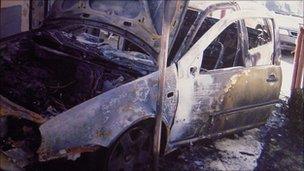
Mr Stojkovic says his son was at home when the bomb attack was carried out
Car mechanic Dragan Stojkovic surveys the damage to the garage adjoining his house. There are hundreds of little holes in the walls and ceiling.
"It must have been a nail bomb," he says, running his hands over the scarred plaster.
"The awful thing was that my 11-year-old was at home just behind the garage at the time."
Beyond his work replacing tyres and repairing cars, Mr Stojkovic has political ambitions.
He formed a party last year in his home town of Zvecan, in northern Kosovo.
The area is populated mainly by ethnic Serbs fiercely opposed to the unilateral declaration of independence from Serbia in 2008 by Kosovo's ethnic Albanian majority.
'Terrifying'
Mr Stojkovic is a rare breed in the north - a Serb who had wanted to run in Sunday's parliamentary election in Kosovo.
But that did not go down well with many locals, who saw it as a betrayal of Serbia's continuing claim on its former province.
One night last month, a grenade was thrown at Mr Stojkovic's house and his car was blown up - the third attack on his life in the space of a year.
He has since decided it is not safe to take part in the election.
"It was terrifying," he says. "I want to participate in politics because I live here."
"Recognition of Kosovo's independence is a question for the state. I just operate at a local level," he adds.
The depth of hostility to Kosovo's secession among Serbs in the north is such that nobody expects any significant number to vote in Sunday's poll - the first parliamentary election in Kosovo since it declared independence.
On Wednesday, a pro-election activist in the north was killed. The only posters on display are those calling for a boycott.
Enclaves
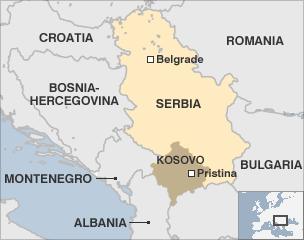
Almost three years since the split, the Kosovan capital, Pristina, still does not control the north.
Serbia maintains its grip; Belgrade organised elections to Serb-led "parallel institutions" there last May. The political vacuum has allowed crime to flourish.
But further south in the so-called Serb enclaves, it is a different story.
Campaign posters of ethnic Serb parties running in the election are all over Gracanica, a predominantly Serb area near Pristina.
The town chose a Serb mayor in Kosovan-run local elections last year.
Serbs in Gracanica, far from the Serbian border and cut off from Belgrade, are increasingly engaging with Kosovan institutions.
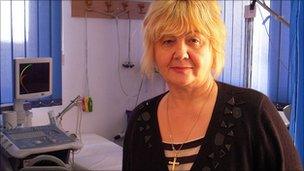
Rada Trajkovic of the United Serb List coalition expects significant support on Sunday
Rada Trajkovic, a local doctor, is running in the poll for the United Serb List coalition and expects significant support.
"I don't have the real desire to engage with the Albanian institutions, but there's a need for the Serb voice to be heard," she says.
"Here we recognise the reality on the ground. I hope we can have a genuine multi-ethnic dialogue in parliament, because I hate the ethnic division between north and south."
Beset by problems
Serbs only number around 120,000 out of Kosovo's population of two million.
But their attitude and engagement with Pristina is crucial to Kosovo's aim of building the multi-ethnic state that its constitution defines.
Many of them are still led by the position of the Serbia's government.
Belgrade has not directly called for Serbs to boycott this election, but says conditions are not right for them to take part.
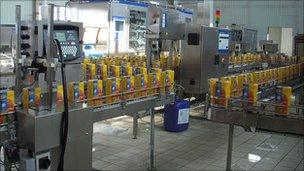
Bashkim Osmani's costs have been hit by being unable to transport goods through Serbia
Perhaps more would choose to do so if the attraction of life in Kosovo were stronger.
As it is, this disputed territory limps on, beset by problems.
Widespread and institutional corruption dog Kosovan society, unemployment is stuck at 45% - higher among young people - and the economy is one of the weakest in Europe.
Infrastructure destroyed during the 1990s war between Serbs and Albanians has barely recovered, while foreign investment is scarce and exports suffer from a block on Kosovan goods entering Serbia.
And still only 72 countries have recognised the Republic of Kosovo.
Big challenge
They are all factors that Bashkim Osmani has tried to overcome as manager of the Laberion fruit-juice company.
On the factory floor, cartons of orange juice whizz past on the conveyor belt, packaged up with the latest machinery and sold both within Kosovo and abroad.
He was named Kosovo's top businessman last year but even he made a loss.
Not being able to transport goods through Serbia has increased his costs by around 40%.
"The government isn't doing enough to help producers like us," he says.
"They must lower taxes on basic products and stimulate the economy by reducing VAT. It is so hard succeeding here. The economy is the most important issue in this election."
And yet it is hard to pick one single factor topping voters' concerns out of the myriad difficulties Kosovo faces.
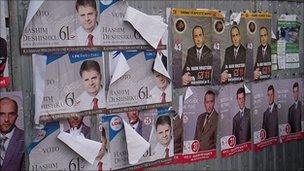
The glimmer of hope may come early next year when Pristina and Belgrade begin their first face-to-face dialogue, coordinated by the EU.
It aims to resolve practical issues such as telecommunications - Kosovo is still denied an international dialling code, forced to borrow mobile phone prefixes from Monaco and Slovenia.
The talks should ease the continuing ethnic tension. But it will be a long process - reconciliation between Serbs and Albanians is slow and painful.
And so, tiny Kosovo faces its first major democratic test.
For many Kosovars - Europe's youngest population - this will be the first time they cast their ballot.
They crave a strong, courageous government, prepared to rise to a very big challenge.
- Published9 December 2010
- Published2 November 2010